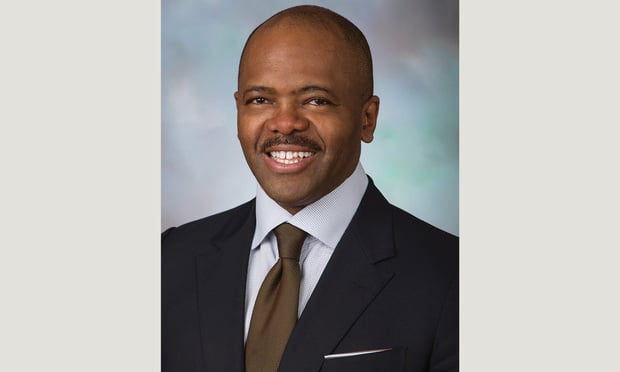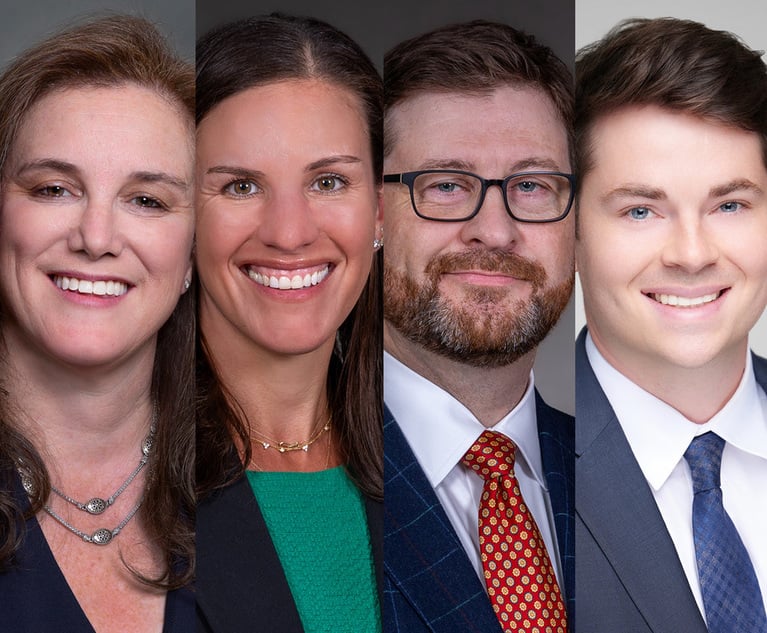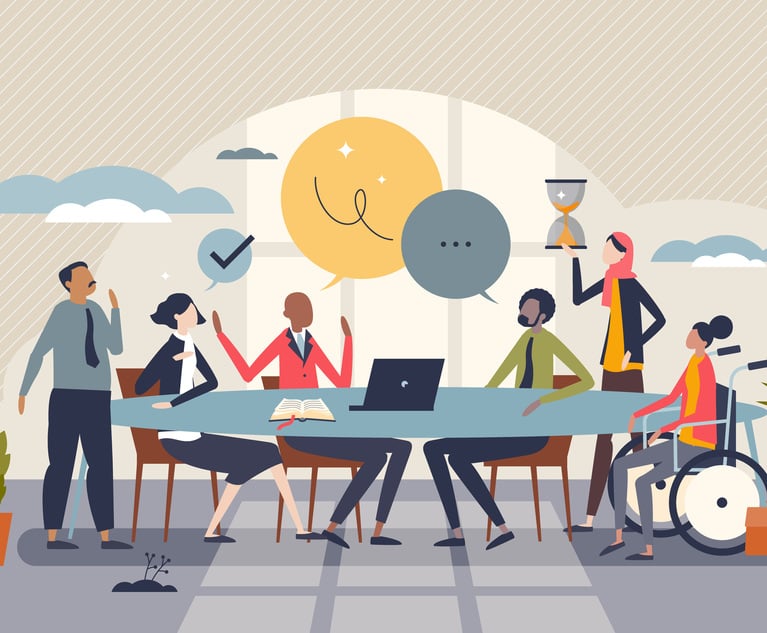Talking 'The Talk': Words Seem Futile When Videos Speak for Themselves
There is a very difficult discussion that every parent of a black son has to have. We call it, "The Talk." It is that discussion wherein we inform our sons that even the most benign interactions could turn lethal in an instant.
June 02, 2020 at 01:55 PM
7 minute read
 Joseph West of Duane Morris
Joseph West of Duane Morris
Last week, McKinsey & Co. released its third report in five years showing that diverse and inclusive businesses outperform their less diverse competitors. This additional data underscores what many of us have reported for years about the business case of diversity.
What the data rarely captures is what lurks underneath the numbers: The experiences that diverse people bring with us and that we cannot leave behind whenever we return again to the physical workplace.
There is a very difficult discussion that every parent of a black son has to have. We call it, "The Talk." It is that discussion wherein we inform our sons that even the most benign interactions could turn lethal in an instant, often at the hands of public servants charged with protecting and serving them. I usually give that talk to my teenage boys once per year. Unfortunately, I have had to deliver it four times in the last week, alone.
The first time occurred when we watched footage of Ahmaud Arbery, an unarmed black man, being tracked, cornered and murdered in the street while jogging. The second occurred when Patricia Ripley was filmed by a neighbor attempting to drown her 9-year-old autistic son in a canal in Miami. Upon being thwarted the first time, she took the child to another part of town whereupon she succeeded in drowning the boy and reported to the police that "two armed black men looking for drugs" had abducted him.
Then there was the case of New York City dog walker, Amy Cooper, who tried to physically menace a black gentleman who was bird watching in Central Park and, failing that, issued the most lethal threat she could by informing him she would call the police and tell them (falsely) that she was being attacked by a black man.
Finally, there was the nauseating spectacle of Minneapolis police officer Derek Chauvin using his knee to literally squeeze the life out of an innocent, handcuffed, subdued human being named George Floyd who begged, in a chillingly polite manner, for his life.
What struck me the most about these four incidents was the inverted role the videos played. I recently watched the excellent Netflix documentary "LA92" that underscored the critical difference a secretly recorded video tape made in bringing to light the horrific beating of Rodney King.
In these modern iterations of that grisly tableau, I notice that the perpetrators themselves either knew they were being filmed or actually did the filming themselves. One of the men who hunted Ahmaud Arbery, like so much prey, captured the entire incident, even continuing to film as the young man stumbled away after being shot in the chest at point-blank range.
Consider too, Minneapolis Officer Chauvin's partner who—hands in his pocket—casually chastised the half dozen cellphone wielding bystanders, all imploring him to intervene to stop his partner from murdering George Floyd in broad open daylight.
Amy Cooper, in her haste, actually said to the 911 operator that she was being "threatened by a black man who was also recording her." So certain was she that, upon responding to her race-baited histrionics, the police who would encounter her victim would be so swift, so lethal, so unforgiving in their treatment of him, that he would not even be given the chance to show them his video of her calling in a false report.
Are we now to assume that the veracity of a black man who is the victim of crime is so weighted down with the presumption of guilt that, in the words of Stokley Williams, "… a video these days is not enough proof"?
What a chilling thought, in this era wherein salvation may well lie in the lens of the people's press corp; that legion of amateur reporters comprised essentially of every person of conscience who carries a smartphone.
My greatest task in discussing these sadly recurring vignettes with my sons used to be finding the right words and addressing their inevitable questions. Hauntingly, neither challenge was present these last few times. Sadly, the videos spoke for themselves, and my boys and I found ourselves watching together in stunned silence. Words seemed futile. But now, I have a new worry. In recalling the looks on their faces after we watched each of these episodes and each time we have spoken of them since, I envision myself on a tightrope. I teeter between equipping my flesh and blood with the appropriate sense of wariness that may save their lives, while I risk allowing the reality of racism to smear their finely honed and well-built psyches with the stench of self-doubt.
That, in and of itself, carries its own set of risks. My two youngest, both members of their school's track teams, now hesitate to go on our daily runs with me, the way my neighbors do without hesitation. Those walks in the park or around the neighborhood, that are being enjoyed anew by all of us who can work from home are now a source of tension and outright fear. My youngest son now prefers working out with me to P90X in his basement rec room to going for a run outdoors. "Too much pollen," he says glumly.
My late father had this same talk with me and my brothers decades ago. Given the multiple near fatal encounters I have had since—in fact all black men have had—I have no doubt that he saved my life. But, I still recall with sadness the weariness in his eyes when we first had this talk. I did not understand it then. I certainly do now. His was a time when battles were fought not just against the now-devalued currency of overt bigotry, but against a brand of bias that was not only explicit, but in most cases was codified and infused into the DNA of society at large. He did so in the persistent shadow of unspeakable physical terror, perverse in its familiarity, the likes of which shocks us when we see it today; but which at that time was newsworthy if it didn't occur.
One of my Duane Morris colleagues recently questioned the need for diversity and inclusion programs. Assuming he has read this far into this article, I will share this:
In many of our institutions, the psychological wage of privilege inures to the benefit of some, while the tax of implicit bias impedes the progress of others and exacts a demonstrable toll on the lives and the very psyche of people of color, whether in the classroom, or in the courtroom, in the boardroom or the streets. I say to my doubting colleague that this barrier to the full ability of our institutions to function is as damaging to him as it is to me.
James Baldwin once wrote that for people of color, the most severe judgments we receive come from that merciless tribunal that we carry around in our heads. Society's challenge is to emancipate us of those additional burdens others cannot fathom and to personify those tribunals for purposes of holding accountable those who would weaponize racism and perpetuate fear. My sons should not have to bear that burden any more than anyone else. Perhaps it's time for all of us to have a talk.
Joseph K. West is a partner in Duane Morris' trial practice group and practices in the area of complex litigation, handling a variety of matters in areas including, but not limited to, class actions, insurance litigation, commercial litigation, zoning and land use, catastrophic injury, products liability, and labor and employment. West is also a member of the firm's partners board and serves as the firm's chief diversity and inclusion officer.
NOT FOR REPRINT
© 2025 ALM Global, LLC, All Rights Reserved. Request academic re-use from www.copyright.com. All other uses, submit a request to [email protected]. For more information visit Asset & Logo Licensing.
You Might Like
View All
Smaller Firms in 'Growth Mode' as Competition, Rates Heat Up


Law Firms Mentioned
Trending Stories
- 1Is It Time for Large UK Law Firms to Begin Taking Private Equity Investment?
- 2Federal Judge Pauses Trump Funding Freeze as Democratic AGs Launch Defensive Measure
- 3Class Action Litigator Tapped to Lead Shook, Hardy & Bacon's Houston Office
- 4Arizona Supreme Court Presses Pause on KPMG's Bid to Deliver Legal Services
- 5Bill Would Consolidate Antitrust Enforcement Under DOJ
Who Got The Work
J. Brugh Lower of Gibbons has entered an appearance for industrial equipment supplier Devco Corporation in a pending trademark infringement lawsuit. The suit, accusing the defendant of selling knock-off Graco products, was filed Dec. 18 in New Jersey District Court by Rivkin Radler on behalf of Graco Inc. and Graco Minnesota. The case, assigned to U.S. District Judge Zahid N. Quraishi, is 3:24-cv-11294, Graco Inc. et al v. Devco Corporation.
Who Got The Work
Rebecca Maller-Stein and Kent A. Yalowitz of Arnold & Porter Kaye Scholer have entered their appearances for Hanaco Venture Capital and its executives, Lior Prosor and David Frankel, in a pending securities lawsuit. The action, filed on Dec. 24 in New York Southern District Court by Zell, Aron & Co. on behalf of Goldeneye Advisors, accuses the defendants of negligently and fraudulently managing the plaintiff's $1 million investment. The case, assigned to U.S. District Judge Vernon S. Broderick, is 1:24-cv-09918, Goldeneye Advisors, LLC v. Hanaco Venture Capital, Ltd. et al.
Who Got The Work
Attorneys from A&O Shearman has stepped in as defense counsel for Toronto-Dominion Bank and other defendants in a pending securities class action. The suit, filed Dec. 11 in New York Southern District Court by Bleichmar Fonti & Auld, accuses the defendants of concealing the bank's 'pervasive' deficiencies in regards to its compliance with the Bank Secrecy Act and the quality of its anti-money laundering controls. The case, assigned to U.S. District Judge Arun Subramanian, is 1:24-cv-09445, Gonzalez v. The Toronto-Dominion Bank et al.
Who Got The Work
Crown Castle International, a Pennsylvania company providing shared communications infrastructure, has turned to Luke D. Wolf of Gordon Rees Scully Mansukhani to fend off a pending breach-of-contract lawsuit. The court action, filed Nov. 25 in Michigan Eastern District Court by Hooper Hathaway PC on behalf of The Town Residences LLC, accuses Crown Castle of failing to transfer approximately $30,000 in utility payments from T-Mobile in breach of a roof-top lease and assignment agreement. The case, assigned to U.S. District Judge Susan K. Declercq, is 2:24-cv-13131, The Town Residences LLC v. T-Mobile US, Inc. et al.
Who Got The Work
Wilfred P. Coronato and Daniel M. Schwartz of McCarter & English have stepped in as defense counsel to Electrolux Home Products Inc. in a pending product liability lawsuit. The court action, filed Nov. 26 in New York Eastern District Court by Poulos Lopiccolo PC and Nagel Rice LLP on behalf of David Stern, alleges that the defendant's refrigerators’ drawers and shelving repeatedly break and fall apart within months after purchase. The case, assigned to U.S. District Judge Joan M. Azrack, is 2:24-cv-08204, Stern v. Electrolux Home Products, Inc.
Featured Firms
Law Offices of Gary Martin Hays & Associates, P.C.
(470) 294-1674
Law Offices of Mark E. Salomone
(857) 444-6468
Smith & Hassler
(713) 739-1250






